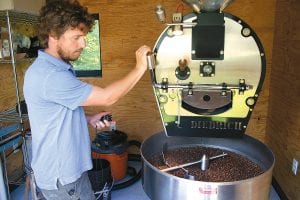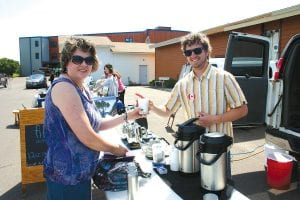Above: Joshua Lindstrom of Grand Marais roasts a batch of coffee beans in his propane-fueled Deidrich IR-12. He and his wife Stephanie have started a coffee roasting business called Fika Coffee and are offering their product to both retail businesses and individual customers. They are selling fresh-brewed hot and iced coffee as well as roasted beans at the Grand Marais Farmer’s Market on Saturdays through October. Left: Joshua hands a cup of coffee to Melissa Breitsprecher of Grand Marais at the Farmer’s Market in the municipal parking lot adjacent to the Cook County Senior Center.

Let’s stop what we’re doing and sit down and enjoy a cup of coffee and a sweet roll or a little sandwich together. Let’s fika!
That’s what Joshua and Stephanie Lindstrom of Grand Marais are doing a lot of these days. They have started a coffee bean roasting business called Fika Coffee (pronounced FEEkah) that they hope will keep a good Swedish tradition alive in Cook County and potentially add an industry to the local economy. The history
On their honeymoon eight years ago, Joshua and Stephanie found a little coffee shop that roasted its own beans in Florence, Oregon, a little tourist town on the Pacific coast. They thought about how wonderful it would be if they could craft a product in Grand Marais that would provide jobs for other people.
Several years later, Joshua went through a two-year internship with Muncie Alliance Church in Indiana, which has a coffee roasting company called Alliance World Coffees. There he learned about everything from buying to roasting to brewing. The beans
A good cup of coffee starts with a quality green bean. Coffee is a seasonal fruit and freshness is important, said Joshua, so he searches out the freshest beans from around the world. This summer, Joshua has been roasting and selling beans from Ethiopia and Chiapas, Mexico.
Coffee beans are seeds taken out of coffee bush berries after they are picked. They are washed, dried, and fermented near where they are picked, a process that affects the eventual taste of the coffee. Factors such as the soil, other plants growing nearby, the elevation, and even which side of a mountain the bush grew on make a difference as well. Joshua researches all this when he’s ready to replenish his stock.
Specialty coffee is very labor-intensive, Joshua said. Growing it, processing it, and getting it to the United States represents a lot of work by a lot of people, and he wants to share this story with his customers.
Joshua looks for coffee growers and wholesalers that operate with integrity. He has been going through a privately owned importing company in the Cities, Café Imports, that sends its buyer to look for farms that operate under sustainable ecological, social, and economic principles. “Where you find quality, you’re going to find healthy, sustainable practices,” he said. “People are being taken care of along the way.” Roasting
On a sunny summer morning, Joshua opens the doors to a small building outside his family cabin a couple miles from town and begins to roast a batch of green coffee beans. He dumps green beans into a drum where they spin around a propane burner that heats them indirectly, carmelizing the sugars inside.
Joshua roasts anywhere from eight to 24 pounds at a time, pulling out samples as they roast. It’s a quick process of only 12 to 14 minutes, and air is blown through the batch right away when they are done in order to cool them down quickly.
“Roasting is part art and part science,” Joshua said. “The art is getting the right roast, and the science is getting it again and again.” Selling
Through October, the Lindstroms will be selling 12-ounce bags of beans and brewing 12-ounce cups of hot coffee or 16-ounce cups of iced coffee at the Grand Marais Farmer’s Market every Saturday. They are officially open from 9 to 1, but Joshua tries to be set up and ready to serve early morning risers by 7 a.m. Often their three little blonde-haired, blueeyed children are with them – Claire, 5, Sophia, 4, and Leif, 1.
Customers can choose either a French press or a pour-over method for the coffee they buy at the Farmer’s Market. A simple syrup is available for the iced coffee, but be careful about asking for sugar in your hot coffee – Joshua might accommodate you, but if you buy from him regularly, he might eventually encourage you to try it without sugar.
Americans are used to dark, heavy, strong coffee, Joshua said, and while they know the taste of burnt toast, they might not recognize burnt coffee. “When people think of coffee, they think of something that punches them in the face,” Joshua said. “A lot of people are accustomed to drinking burnt coffee.” French and Italian roasts are dark. “I would say that it’s burnt,” he said. “I think that’s why people originally put cream and sugar into their coffee. …A well roasted coffee has a natural sweetness to it.”
One die-hard cream and sugar fan told him, “This is the best coffee I’ve had! I didn’t have to put cream and sugar into it!”
One friend told Joshua, “I could just drink your coffee all day.” Storing
“The four enemies of coffee are heat, air, moisture, and light,” said Joshua. He keeps his own coffee in a cool, dark, dry cupboard. Fika Coffee comes in bags that have a one-way valve that releases gases but does not let moisture or air back in.
Joshua recommends drinking coffee within three weeks of roasting, and he isn’t very keen on freezing coffee. “If you’re freezing coffee,” he said, “you’re probably buying more than you need upfront.” Envisioning
Joshua is selling two types of bean right now but hopes to offer a decaf, a blend, and two or three different single-origin coffees eventually.
“My big vision is I want to have a wholesale company,” Joshua said. He wants to sell locally but also develop a market in other areas whose economies are not as seasonal. “I want to create two to three year-round sustainable jobs here in Cook County,” he said. Drinking
Coffee is not about simply getting a caffeine kick for Joshua. It’s about taking time out for it, enjoying it, and sharing the experience with others. It’s a ritual.
Joshua prefers to make his coffee one cup at a time with a Chemix coffee maker or a Hario V60, which work a little slower than a standard coffee maker. “That’s part of the process,” Joshua said. “It’s about being able to take a break in your day and connect with friends and family. This process also leads to a better cup of coffee.”
Friends dropping by are likely to be asked, “Do you want to come in and fika for a little bit?”
“Are you allowed to drink coffee?” Joshua and Stephanie’s daughter Sophia was asked. She shook her head. “Does Dad try and get you to drink his coffee?” She nodded her head.
Fika Coffee beans are available to individual customers and for resale at retail businesses. More information is available at:
.www.fikacoffee.com .On Facebook, and on Twitter under “The Fika Coffee” .Joshua can be reached at joshua@fikacoffee.com or (218)387-4040
A fika is a moment of quiet indulgence in an otherwise hectic day, a time to gather with good friends for great conversation, a sweet treat, and a hot cup of coffee. This concept shapes everything from how we roast our beans to how we connect with customers.



Loading Comments